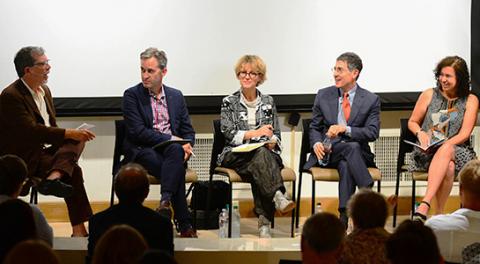Press Freedom in Focus at Panel Discussion

Press freedom is at risk worldwide, with life-threatening consequences for journalists, according to an all-star roster of experts who spoke at UCLA School of Law.
The panel "Cross-Border Legal Threats to Press Freedom" drew more than 150 law students, practitioners and media professionals to a Sept. 19 discussion moderated by Dale Cohen, director of UCLA Law's Documentary Film Legal Clinic.
The discussion was part of LA Press Freedom Week, an annual event highlighting threats to journalism and journalists. The Hollywood Foreign Press Association, the Los Angeles Times, the Committee to Protect Journalists and the Reporter's Committee for Freedom of the Press co-sponsored the event, along with UCLA Law's Ziffren Center for Media, Entertainment, Technology and Sports Law.
Panelists included Mónica Almeida of El Universo, one of the largest newspapers Ecuador; Bruce Brown, executive director of the Reporter's Committee for Freedom of the Press and a partner in the Washington office of Baker & Hostetler; Agnés Callamard, the United Nations Special Rapporteur on Extrajudicial, Summary or Arbitrary Executions who has gained acclaim for her work investigating the murder of Washington Post death Jamal Khashoggi; and David Kaye, a law professor at UC Irvine and the United Nations Special Rapporteur on the Promotion and Protection of the Right to Freedom of Opinion and Expression.
With journalists attempting to shed light on international stories such as migration to the United States from Central America and the cross-border flow of private wealth revealed by the Panama Papers, weaker legal protections for press freedom in one country threaten freedoms elsewhere. Kaye told the audience that claims from government leaders that independent reporting is a threat to national security poses danger to journalists and to democracy. "Journalism is being redefined as terrorism in many countries," he said, and leaders including President Trump have called journalists "enemies of the people."
Almeida detailed how her work and the work of others in Ecuador was threatened by former Ecuadoran President Rafael Correa. She said Correa hosted radio and television shows designed specifically to paint the press as corrupt and untrustworthy. Noting that his anti-press campaign took place in multiple phases, Almeida said Correa succeeded in forcing an ominous change in the law to allow the government to be the arbiter of whether information is truthful.
Callamard suggested that legal educators could play a positive role by offering courses covering freedom of speech laws in multiple jurisdictions, so students can better understand the issues at play. "Law schools should ensure that freedom of expression is taught from a global standpoint," she said.